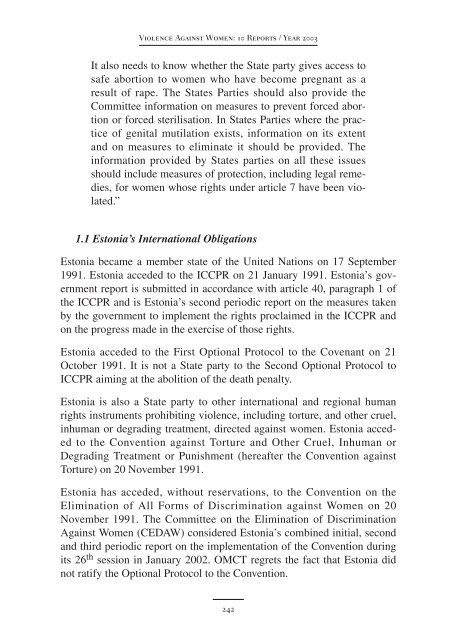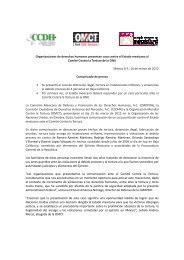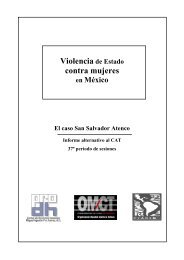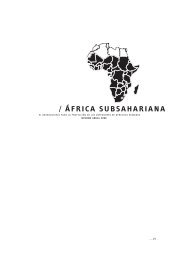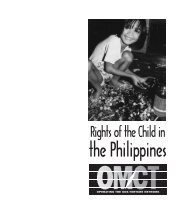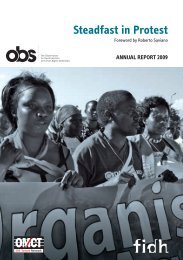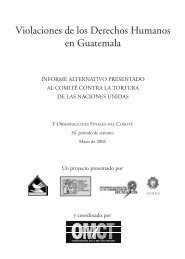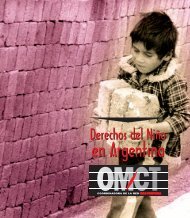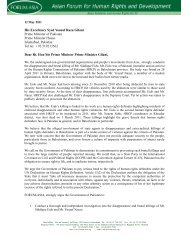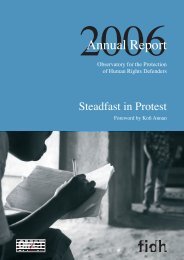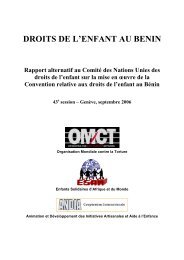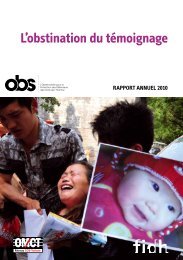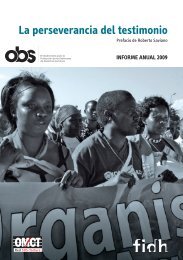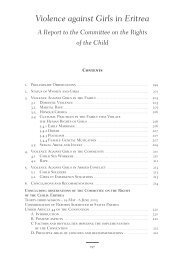- Page 3 and 4:
Created in 1986, the World Organisa
- Page 5:
Violence Against Women: 10 Reports
- Page 9 and 10:
Violence Against Women: 10 Reports
- Page 11 and 12:
Violence Against Women: 10 Reports
- Page 14:
Violence against Girls in Banglades
- Page 17 and 18:
Violence Against Women: 10 Reports
- Page 19 and 20:
Violence Against Women: 10 Reports
- Page 21 and 22:
Violence Against Women: 10 Reports
- Page 23 and 24:
Violence Against Women: 10 Reports
- Page 25 and 26:
Violence Against Women: 10 Reports
- Page 27 and 28:
Violence Against Women: 10 Reports
- Page 29 and 30:
Violence Against Women: 10 Reports
- Page 31 and 32:
Violence Against Women: 10 Reports
- Page 33 and 34:
Violence Against Women: 10 Reports
- Page 35 and 36:
Violence Against Women: 10 Reports
- Page 37 and 38:
Violence Against Women: 10 Reports
- Page 39 and 40:
Violence Against Women: 10 Reports
- Page 41 and 42:
Violence Against Women: 10 Reports
- Page 43 and 44:
Violence Against Women: 10 Reports
- Page 45 and 46:
Violence Against Women: 10 Reports
- Page 47 and 48:
Violence Against Women: 10 Reports
- Page 49 and 50:
Violence Against Women: 10 Reports
- Page 51 and 52:
Violence Against Women: 10 Reports
- Page 53 and 54:
Violence Against Women: 10 Reports
- Page 55 and 56:
Violence Against Women: 10 Reports
- Page 57 and 58:
Violence Against Women: 10 Reports
- Page 59 and 60:
Violence Against Women: 10 Reports
- Page 61 and 62:
Violence Against Women: 10 Reports
- Page 63 and 64:
Violence Against Women: 10 Reports
- Page 65 and 66:
Violence Against Women: 10 Reports
- Page 67 and 68:
Violence Against Women: 10 Reports
- Page 69 and 70:
Violence Against Women: 10 Reports
- Page 71 and 72:
Violence Against Women: 10 Reports
- Page 73 and 74:
Violence Against Women: 10 Reports
- Page 75 and 76:
Violence Against Women: 10 Reports
- Page 77 and 78:
Violence Against Women: 10 Reports
- Page 79 and 80:
Violence Against Women: 10 Reports
- Page 81 and 82:
Violence Against Women: 10 Reports
- Page 83 and 84:
Violence Against Women: 10 Reports
- Page 85 and 86:
Violence Against Women: 10 Reports
- Page 87 and 88:
Violence Against Women: 10 Reports
- Page 89 and 90:
Violence Against Women: 10 Reports
- Page 91 and 92:
Violence Against Women: 10 Reports
- Page 93 and 94:
Violence Against Women: 10 Reports
- Page 95 and 96:
Violence Against Women: 10 Reports
- Page 97 and 98:
Violence Against Women: 10 Reports
- Page 99 and 100:
Violence Against Women: 10 Reports
- Page 101 and 102:
Violence Against Women: 10 Reports
- Page 103 and 104:
Violence Against Women: 10 Reports
- Page 105 and 106:
Violence Against Women: 10 Reports
- Page 107 and 108:
Violence Against Women: 10 Reports
- Page 109 and 110:
Violence Against Women: 10 Reports
- Page 111 and 112:
Violence Against Women: 10 Reports
- Page 113 and 114:
Violence Against Women: 10 Reports
- Page 115 and 116:
Violence Against Women: 10 Reports
- Page 118:
Violence against Women in CameroonA
- Page 121 and 122:
Violence Against Women: 10 Reports
- Page 123 and 124:
Violence Against Women: 10 Reports
- Page 125 and 126:
Violence Against Women: 10 Reports
- Page 127 and 128:
Violence Against Women: 10 Reports
- Page 129 and 130:
Violence Against Women: 10 Reports
- Page 131 and 132:
Violence Against Women: 10 Reports
- Page 133 and 134:
Violence Against Women: 10 Reports
- Page 135 and 136:
Violence Against Women: 10 Reports
- Page 137 and 138:
Violence Against Women: 10 Reports
- Page 139 and 140:
Violence Against Women: 10 Reports
- Page 141 and 142:
Violence Against Women: 10 Reports
- Page 143 and 144:
Violence Against Women: 10 Reports
- Page 145 and 146:
Violence Against Women: 10 Reports
- Page 147 and 148:
Violence Against Women: 10 Reports
- Page 149 and 150:
Violence Against Women: 10 Reports
- Page 151 and 152:
Violence Against Women: 10 Reports
- Page 153 and 154:
Violence Against Women: 10 Reports
- Page 156:
Violence against Women in ColombiaA
- Page 159 and 160:
Violence Against Women: 10 Reports
- Page 161 and 162:
Violence Against Women: 10 Reports
- Page 163 and 164:
Violence Against Women: 10 Reports
- Page 165 and 166:
Violence Against Women: 10 Reports
- Page 167 and 168:
Violence Against Women: 10 Reports
- Page 169 and 170:
Violence Against Women: 10 Reports
- Page 171 and 172:
Violence Against Women: 10 Reports
- Page 173 and 174:
Violence Against Women: 10 Reports
- Page 175 and 176:
Violence Against Women: 10 Reports
- Page 177 and 178:
Violence Against Women: 10 Reports
- Page 179 and 180:
Violence Against Women: 10 Reports
- Page 181 and 182:
Violence Against Women: 10 Reports
- Page 183 and 184:
Violence Against Women: 10 Reports
- Page 185 and 186:
Violence Against Women: 10 Reports
- Page 187 and 188:
Violence Against Women: 10 Reports
- Page 189 and 190:
Violence Against Women: 10 Reports
- Page 191 and 192: Violence Against Women: 10 Reports
- Page 193 and 194: Violence Against Women: 10 Reports
- Page 195 and 196: Violence Against Women: 10 Reports
- Page 198: Violence against Girls in EritreaA
- Page 201 and 202: Violence Against Women: 10 Reports
- Page 203 and 204: Violence Against Women: 10 Reports
- Page 205 and 206: Violence Against Women: 10 Reports
- Page 207 and 208: Violence Against Women: 10 Reports
- Page 209 and 210: genital organs for cultural or othe
- Page 211 and 212: Violence Against Women: 10 Reports
- Page 213 and 214: Despite the lack of information con
- Page 215 and 216: Violence Against Women: 10 Reports
- Page 217 and 218: Violence Against Women: 10 Reports
- Page 219 and 220: Violence Against Women: 10 Reports
- Page 221 and 222: Violence Against Women: 10 Reports
- Page 223 and 224: Violence Against Women: 10 Reports
- Page 225 and 226: Violence Against Women: 10 Reports
- Page 227 and 228: Violence Against Women: 10 Reports
- Page 229 and 230: Violence Against Women: 10 Reports
- Page 231 and 232: Violence Against Women: 10 Reports
- Page 233 and 234: Violence Against Women: 10 Reports
- Page 235 and 236: Violence Against Women: 10 Reports
- Page 237 and 238: Violence Against Women: 10 Reports
- Page 240: Violence against Women in EstoniaA
- Page 245 and 246: Violence Against Women: 10 Reports
- Page 247 and 248: Violence Against Women: 10 Reports
- Page 249 and 250: Violence Against Women: 10 Reports
- Page 251 and 252: Violence Against Women: 10 Reports
- Page 253 and 254: Violence Against Women: 10 Reports
- Page 255 and 256: Violence Against Women: 10 Reports
- Page 257 and 258: Violence Against Women: 10 Reports
- Page 259 and 260: Violence Against Women: 10 Reports
- Page 261 and 262: Violence Against Women: 10 Reports
- Page 263 and 264: Violence Against Women: 10 Reports
- Page 265 and 266: Violence Against Women: 10 Reports
- Page 267 and 268: Violence Against Women: 10 Reports
- Page 270: Violence against Women in MaliA Rep
- Page 273 and 274: Violence Against Women: 10 Reports
- Page 275 and 276: Violence Against Women: 10 Reports
- Page 277 and 278: Violence Against Women: 10 Reports
- Page 279 and 280: Violence Against Women: 10 Reports
- Page 281 and 282: Violence Against Women: 10 Reports
- Page 283 and 284: Violence Against Women: 10 Reports
- Page 285 and 286: Violence Against Women: 10 Reports
- Page 287 and 288: Violence Against Women: 10 Reports
- Page 289 and 290: Violence Against Women: 10 Reports
- Page 291 and 292:
Violence Against Women: 10 Reports
- Page 293 and 294:
Violence Against Women: 10 Reports
- Page 295 and 296:
Violence Against Women: 10 Reports
- Page 298:
Violence against Women in RussiaA R
- Page 301 and 302:
Violence Against Women: 10 Reports
- Page 303 and 304:
law offers no clear definition of
- Page 305 and 306:
Violence Against Women: 10 Reports
- Page 307 and 308:
Violence Against Women: 10 Reports
- Page 309 and 310:
Violence Against Women: 10 Reports
- Page 311 and 312:
Violence Against Women: 10 Reports
- Page 313 and 314:
Violence Against Women: 10 Reports
- Page 315 and 316:
Violence Against Women: 10 Reports
- Page 317 and 318:
Violence Against Women: 10 Reports
- Page 319 and 320:
Violence Against Women: 10 Reports
- Page 321 and 322:
Violence Against Women: 10 Reports
- Page 323 and 324:
Violence Against Women: 10 Reports
- Page 325 and 326:
Violence Against Women: 10 Reports
- Page 327 and 328:
Violence Against Women: 10 Reports
- Page 329 and 330:
Violence Against Women: 10 Reports
- Page 331 and 332:
Violence Against Women: 10 Reports
- Page 333 and 334:
Violence Against Women: 10 Reports
- Page 335 and 336:
Violence Against Women: 10 Reports
- Page 337 and 338:
Violence Against Women: 10 Reports
- Page 339 and 340:
Violence Against Women: 10 Reports
- Page 342 and 343:
Turkey1. Preliminary RemarksThe sub
- Page 344 and 345:
Turkey1.2 General ObservationsTurke
- Page 346 and 347:
TurkeyCivil Code which came into ef
- Page 348 and 349:
Turkeyrapid urbanization and persis
- Page 350 and 351:
TurkeyA new law passed in 1998 stre
- Page 352 and 353:
Turkeygirls occurs when a woman all
- Page 354 and 355:
TurkeyNGOs she spoke with did not c
- Page 356 and 357:
Turkeyconcern that the concept of
- Page 358 and 359:
Turkeythis act and action shall be
- Page 360 and 361:
TurkeyTurkey has signed but not rat
- Page 362 and 363:
Turkeydays. The amendment provides
- Page 364 and 365:
TurkeyTurkish government must do mu
- Page 366 and 367:
Turkeya cell. Unreported detention
- Page 368 and 369:
TurkeyWomen’s rights groups are e
- Page 370 and 371:
TurkeyCases of Violence at the Hand
- Page 372 and 373:
Turkey6. Conclusions and Recommenda
- Page 374 and 375:
Turkeyacceptance of honour-related
- Page 376 and 377:
Turkeythe European Committee on the
- Page 378 and 379:
Turkeythe country average, with a r
- Page 380 and 381:
TurkeyCommittee against TortureTHIR
- Page 382 and 383:
Turkey(d) Allegations that despite
- Page 384:
TurkeyProgramme of Turkey (1998-200
- Page 388 and 389:
United Kingdom1. Preliminary Observ
- Page 390 and 391:
United Kingdommen and women, especi
- Page 392 and 393:
United Kingdomdespite entering scho
- Page 394 and 395:
United KingdomAnother report indica
- Page 396 and 397:
United Kingdomimmigrant women, who
- Page 398 and 399:
United KingdomThe restrictions on t
- Page 400 and 401:
United Kingdomof these victims neve
- Page 402 and 403:
United Kingdomtrafficking who are d
- Page 404 and 405:
United Kingdom7. Conclusions and Re
- Page 406 and 407:
United KingdomOMCT is also deeply t
- Page 408 and 409:
United Kingdom9 Home Office, Govern
- Page 410 and 411:
United Kingdom63 Council of Europe,
- Page 412 and 413:
United KingdomCommittee on the Elim
- Page 414 and 415:
United Kingdomgovernmental organiza
- Page 416 and 417:
United Kingdomnationality. In this
- Page 418 and 419:
United KingdomThe Committee refers
- Page 426:
This publication forms part of OMCT


